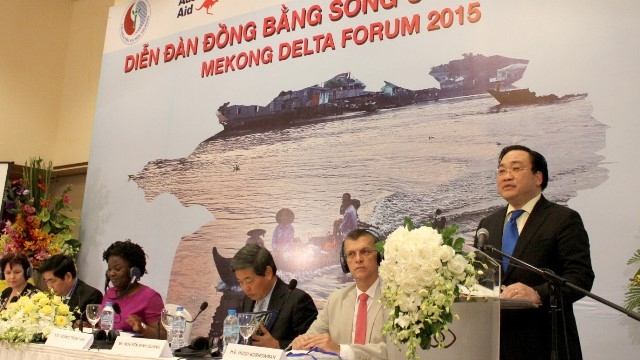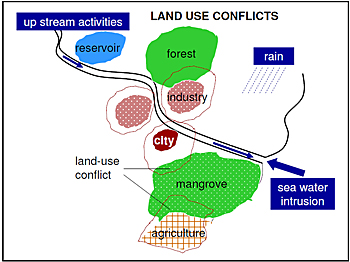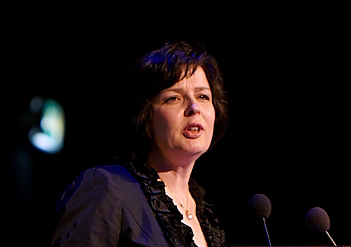Delta Alliance supports Mekong Delta taking next step in safeguarding the delta's values

At the Mekong Delta Forum, held in Ho Chi Minh City on 2 and 3 February, chair of Delta Alliance Tineke Huizinga spoke on the importance of integrating sectoral interests and joint planning and financing. She urged stakeholders to engage in finding optimal solutions to safeguard the values of the river delta.
The forum was organised by the World Bank, and Dutch and Australian governments to facilitate an open discussion about different resilient investments, Delta development objectives, and development trade-offs across sectors.
 Priority to sustainable development
Priority to sustainable development
"We give priority for sustainable development for this area. With its importance, the region should receive such special care," deputy prime minister Hoang Trung Hai (right on top photo) said at the opening of the forum. He added that the Mekong Delta plays a strategic role in food security and sustainable development of the southern region and the country.
The deputy prime minister praised the Dutch government's support in creating the Mekong Delta Plan, which contains a long-term vision and strategy for a safe, prosperous and sustainable delta.
The forum focused on long-term response visions for the Mekong Delta region, such as strengthening the forecast of natural disasters, floods, drought and salt water intrusion.
 Chair Tineke Huizinga of Delta Alliance called up on stakeholders to look for multifunctional solutions and share the benefits.
Chair Tineke Huizinga of Delta Alliance called up on stakeholders to look for multifunctional solutions and share the benefits.
Learning from other delta systems
The forum included sessions on lessons learned from other Delta systems - from Bangladesh, to the Netherlands, to Mississippi, Niger, and Murray Darling deltas.
Speaking from her experience as former State secretary for water management, Tineke Huizinga of Delta Alliance said: "Along our coast we use the rule ‘soft solutions where we can, hard solutions where we must’ opting for non-structural measures wherever possible. It is critical to engage stakeholders in finding optimal solutions, and making the decision-making a bottom-up process."
Moving towards specific concrete actions
Victoria Kwakwa, the World Bank Country Director to Vietnam highlighted three critical elements that are required to be able to move from a shared framework to more specific concrete actions: "The first is to strengthen and improve the institutional mechanisms that enable interprovincial and intersectoral coordination needed for the Mekong Delta. The second is to identify low-regret investments, and relevant climate-smart policies, that are in line with the Mekong Delta Plan recommendations. The third is to proactively mobilize resources to establish a financing mechanism for the Mekong Delta, which enables".
Gaps in knowledge of river deltas
Huizinga stressed the importance of learning from other deltas and jointly filling in research gaps in delta knowledge, offering assistance by Delta Alliance. Her foundation derived delta research gaps from the comparative assessment of 14 worldwide deltas that was published last year.
Furthermore, the alliance actively helps forming coalitions between research institutions, organises training workshops in the various river deltas of the world and has a global network of experts.
This news item is based on releases originally published on the websites of Delta Alliance and World Bank.
Also read on this website
● Deltas 2014: Delta Alliance announces new membership agreements with Kenya and Taiwan, 2 October 2014
● Dutch prime minister Rutte commits to implementation of Mekong Delta Plan, Vietnam, 23 June 2014
● Mekong river delta climate adaptation plan officially presented by Dutch minister Schultz in Hanoi, Vietnam, 17 December 2013
● Dutch consortium granted contract to assist Vietnamese government in long term Mekong Delta plan, 24 January 2012
● Countries: Vietnam
More information
Delta Alliance
Wageningen, the Netherlands
+31 317 481 562
www.delta-alliance.org



